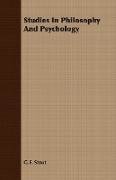STUDIES IN PHILOSOPHY AND PSYCHOLOGY STUDIES IN PHILOSOPHY AND PSYCHOLOGY G. F. STOmrM. A., LL. D., Lnr. D. FELLOW OP THE BRITISH ACADEMY J HONORARY FELLOW OP ST. JOHNS COLLEGE, CAMBRIDGl PROFESSOR OF LOGIC AND METAPHYSICS IN THE UNIVERSITY OF ST. ANDREWS MACMILLAN AND CO., LIMITED ST. MARTINS STREET, LONDON 1930 INTRODUCTION THE order of the papers in this volume is in the main that in which they were written the psychological papers are grouped at the beginning, and the chronological arrange ment is sometimes interrupted to lyiog together papers with closely related subjects. I have pfacetrffielfiDaper on Memory out of its proper order because I wanted to make clear at the outset the distinction between immediate ex perience and thought. I have republished the Herbartian article because the Herbartian Psychology is at least of great historical interest, and there is no other tolerably full account of it in English. None of the other papers is historical. Some of them, such as that on Things and Sensations, do not represent my present position, but they all contain views which, in my opinion, ought to be considered before they are rejected. The treatment of Conation and Mental Activity is mis leading in one important respect. My language seems to imply that the action of the self is or may be purely mental. As I now hold, the self of self-consciousness is primarily and throughout an embodied self it is mind and body in one, and the nature of the unity which comprehends both is known only in self-consciousness, and, is otherwise un intelligible. Hence the activity of the self, though it essen tially involves mind, does not belong to mind alone abstractly considered. This correction doesnot affect the main drift of the paper. On the contrary it ought, if I am right, to remove a difficulty which might otherwise be felt b y the reader. For the concept of a purely mental action is VI STUDIES IN PHILOSOPHY AND PSYCHOLOGY very difficult, even if it is possible at all. The most abstract thinking is experienced as a strenuous bodily effort. The essay on Things and Sensations belongs to an early stage in the development of my thought on the topic of which it treats. I am glad to have this opportunity of in dicating the main points on which I now disagree with it. i I have throughout considered only the knowledge of external objects. I now recognise that what the external object is external to is the embodied self as primarily known in self-consciousness. We cannot therefore give an account of our knowledge of external objects except by giving an account of the distinction and relation of the embodied self and the embodied not-self. 2 I now regard as untenable the distinction which I make in this paper between matter as it is in itself and as it appears to our senses. When I wrote it I was under the influence of such thinkers as Leibniz, Lotze, and W. K. Clifford, who, however widely they may differ from each other, agree that matter as it is in itself is not really material but mental. They are not subjective idealists they hold that what appears to us as a material world really is a system of actual existences enduring, changing, and interacting. But they deny that either the primary or the secondary characters belong to the intrinsic nature of matter as it is in itself. It is we who qualify it by predicates drawn from the immediate content of our own sense experience whichdo not belong to it. If we ask what it is in itself we can only conceive it after the analogy of what we find in our own mental life. In this respect the monadism of Lotze and the mind-stuff theory of Clifford are at one. A doctrine of this type pervades my article on Things and Sensations. But I now reject it. As I now hold, matter and mind are ultimately and essentially distinct, though ultimately and essentially inseparable...


